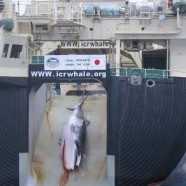Poincaré v. Montaigne
Information note n° 5
Whales at the International Court of Justice
The Hague, The Netherlands, 1st hearing of Japan July 2nd – July 4th
From June 26-28, Australia’s first round of hearings, issues on the purpose of scientific research and on the rationale of hypothesising were raised by the Court. The “positive” contribution to science of JARPA II was put into question. The objectives of the JARPA II program are considered by Australia to be the equivalent of “examining only the European red squirrel to understand what is happening to the European ecosystem” and science which is not built on solid ground. For memory, one of the objectives of JARPA II is to better understand biological parameters in the Antarctic ecosystem (see Information note N°1 for information on Japan’s JARPA objectives). Australia quoted Henri Poincaré, the French Professor, who wrote in 1905 that “science is built up of facts, as a house is built of stones; but an accumulation of facts is no more science than a heap of stones a house”. According to Australia, Japan’s collection of dead whales is not contributing to the stepping stones of scientific progress but a simple proliferation of useless stones.
Japan Strikes Back
Information note n°4
Whales at the International Court of Justice
The Hague, The Netherlands, 1st hearing of Japan, July 2nd – July 3rd
Japan, a country surrounded by sea, states that they “would be the last to misuse whales as resources because [they] know [they] benefit from the fruits of the sea”. Japan goes back in time explaining that they joined the International Whaling Commission (IWC) in 1951 “at a time when, amidst the devastation of war, whale meat helped prevent starvation” for a country with scarce land resources. They go even further back in time and point at the irony of history as it was whaling that forced them to interact with the international community after three hundred years of isolation. Japan stated that in the 19th century, “major maritime powers engaged in massive scale whaling demanded that Japan open up its ports to supply their whalers”. And it is this very subject, whaling, which today puts in question Japan’s compliance with the international community and international law and has brought them, for the first time, before the International Court of Justice.
Japanese “Scientific Whaling” by its Right Name is “Commercial Whaling”
Information note n°3
Whales at the International Court of Justice
The Hague, The Netherlands, 1st hearing of Australia, June 26th – June 28th
In his opening statement for Australia, Mr Campbell projected an image of a Japanese vessel with “Legal Research under the ICRW”* painted on the side and yet another whale lying dead on the slipway. For Australia, this is the image and language of a country trying to convince itself that they are contributing to science and thereby respecting the law. The international community and more specifically the international scientific community is not convinced.
The End of the Japanese Fairy Tale
Information note n°2
Whales at the International Court of Justice
The Hague, The Netherlands, 1st hearing of Australia, June 26th – June 28th
Impressions on the Australian point of view during the hearings from June 26th 27th and 28th 2013
During the first three days of the Australia v. Japan court case at the International Court of Justice, Australia has been presenting arguments stating them loud and clear to wake Japan up from over twenty years’ of sleep. Japan, indeed, had fallen into a deep legal sleep like a “Sleeping Beauty”, and the international community should not wait until a “beautiful white whale” comes along to wake them up. Such was the metaphor used by Mme Boisson De Chazournes when she presented the court with Japan’s interpretation on the wording of the text of the International Whaling Commission (IWC). She stated that contrary to Japan’s reading of the 1946 IWC, the Convention enforces whale conservation and does not provide for the reinforcement of commercial whaling. As to the breaching of international law, and the continuation of whaling by Japan, Australia’s arguments are threefold. Firstly, the use of whale catchers and factory ships, secondly, a clear breaching of the 1986 moratorium on commercial whaling and thirdly, a violation of the Southern Ocean Sanctuary specifically with regard to fin whale catches.
Australia v. Japan
Information note n°1
Whales at the International Court of Justice
Today, Australia is voicing out the cry of the whales by defending them against so-called Japanese scientific whaling. Over the next 3 weeks, public hearings in the case concerning ‘Whaling in the Antarctic’ (Australia v. Japan: New Zealand intervening) will be heard in The Hague at the International Court of Justice. The judgment is expected to be delivered within 4 to 8 months. Australia is hoping that a decision be taken within the next four months, before the next whaling season in the Southern Ocean.
Arctic: Keep it In My Backyard (KIMBY)
The Arctic Council is meeting this week in Kiruna Sweden an appropriately choice for the venue considering that mans’ impacts on the Arctic climate will be high on the agenda. Kiruna hosts the largest underground iron mine in the world where in response to ground deformations caused by mining, the city will be relocated over the coming years. Later this week at Kiruna the eight Arctic States (Russia, Finland, Denmark for Greenland, Sweden, Norway, Iceland, the U.S. and Canada) will sign a ‘Marine Oil Pollution Preparedness and Response’ agreement. The agreement aims to strengthen cooperation, coordination and mutual assistance on pollution preparedness and response in the Arctic in order to protect the marine environment from pollution by oil. Despite this noble promise the agreement does little more than reinforce existing international agreements.
Ivory: A very disturbing premiere !
Whatever the motivations of the ivory thief at the Museum of Natural History in Paris are, this heist is to be taken seriously. Is it a personal initiative, an order, or the emergence of a new underground ivory trafficking network in France and Europe?
Since 2011, 82 rhinoceros horns were stolen in Europe, including 7 in France. These thefts are attributed to organized criminal networks. They target museums, antique dealers, auction rooms, taxidermists, and private collectors. These thefts are sometimes accompanied by violence. In zoos, rhinos are under increased protection. The development of thefts is parallel to the increase of poaching in Africa and Asia and the increased price per kilo of the rhinoceros horn on the legal and black markets. Some experts suggest the price goes up to 65,000 euros per kilo.
CITES has no cure for elephant poaching
Compromise and Rhetoric is killing world’s elephants
Despite the praise for the Convention on International Trade in Endangered Species of Wild Fauna and Flora on its 40th anniversary, CITES has failed to protect the elephant. African elephant populations are under siege and in decline primarily to satiate the demand for ivory in Asia. In 2011 alone, around 25,000 elephants or more were slaughtered for their ivory and the killing was even worse in 2012.
Enough is enough. Several conservation and animal welfare organizations, including the David Shepherd Wildlife Foundation (DSWF-United Kingdom), Elephant Advocacy League (United States), Environmental Investigation Agency (EIA-United Kingdom), Fondation Franz Weber (FFW-Switzerland), International Ranger Federation (Australia), Last Great Ape Organization (LAGA-Cameroon), Pro Wildlife (Germany), Robin des Bois (France), Youth for Conservation (Kenya) attending the 16th meeting of the CITES Conference of the Parties are outraged by the failure of CITES to stop the poaching of African elephants, particularly African elephants. Instead of demanding an end to the markets driving the slaughter, CITES Parties are coming up with weak compromises in a feeble attempt to stop the poaching. But China, the single country most responsible for the crisis due to its burgeoning ivory market, won’t even concede its responsibility as the main problem. Nor will CITES admit that previous decisions allowing “legal” sale of ivory to China and Japan have stimulated, not reduced, demand and directly contributed to the poaching.
Would you please revive the species?
CITES – Bangkok
Press Release # 8
Animal species are extinguished. The plenary of CITES (Convention on International Trade in Endangered Species of Wild Fauna and Flora) in Bangkok was the opportunity to bury, without ceremony, the Thylacinus cynocephalus and some other species wiped off the planet in the past century. Their family trees date back several million years. Extinctions are accelerating.
These biological disasters are not caused by any disruptions in climate, geological mutations or functional inadequacies. Mankind is the conductor of these disasters, wreaking havoc through risky manipulations or introductions and through radical exploitation of its surroundings.












